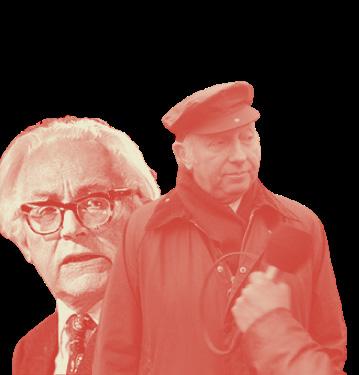
7 minute read
Alex Beard: How socialist is Sanders?
How socialist is Sanders? The case for a class struggle social democracy Alex Beard, History and German at University College
Liberal commentators never really decided what exactly Bernie Sanders was. Sometimes, he was a dangerous radical whose nomination would render the Democratic Party unelectable. In other instances (and most notably when it appeared he might win), he was simply a sheep in wolf’s clothing: a New Deal liberal who chose the perverse label of ‘democratic socialist’. Even some of his campaign’s supporters lamented what they saw as an unnecessary and distracting association with that concept – socialism – towards which the majority of Americans were considered hostile. There are, on the surface, reasonable grounds for rejecting Sanders’ controversial claim to socialism. The promises of universal healthcare provision and of greater state expenditure to tackle climate change, although derided by establishment Democrats, would barely have brought America up
Advertisement
to speed with the ‘social market economies’ of countries such as Germany, let alone the liberal ‘social democracies’ of Northern Europe. Why, then, does an American politician seeking election on a set of policies to the right of the demands of most European left-liberals call tar himself with the brush of socialism? A compelling answer would be that the colour of Sanders’ politics rests less on the Rooseveltian social changes that would result from a four-year presidency), and more on the radical way these changes would be brought about, in line with his political hero: Eugene Debs.
I believe socialists in the Marxist tradition must reclaim the movement behind Bernie Sanders and other US democratic socialists. Even where Sanders’ policies do not represent an unprecedented break with capitalism, both his 2016 and 2020 campaigns spoke the language of a class conflict which did not begin or end at the ballot box. It relied explicitly on an active mass movement of the ‘99%’ defined in opposition to corporate interests. As such, they represented a rejection not only of left neoliberalism, but also of the class compromise of post-war social democracy. The victory of such a campaign would represent the establishment of a ‘class struggle social democracy’ which could (or, depending on your analysis, necessarily would) make way for democratic socialism. The alternative to socialist support for these movements, which have already proven their ability to galvanize, is that they become steadily deradicalized: their most inoffensive demands are adopted, their figureheads co-opted and their rhetoric defanged by the liberal establishment. It is the aim of this article to offer a tentative attempt at locating modern democratic socialist thought within Marxism, focusing on trends in America, and to consider its utility in bringing about a post-capitalist society. In doing so, it is necessary to separate the period of transition, which we might refer to as class struggle social democracy, from the end goal, that of a democratic socialism.
‘Jacobinism’ Somewhat perversely, the infrastructure of the socialist movement in the United States was only re-established after the defeat of Bernie Sanders and Donald Trump’s election in 2016. In the intervening period, Democratic Socialists of America (DSA) have seen their membership balloon from some 10,000 before Sanders’ first campaign to the roughly 85,000
who now pay their dues. Among its number are members of Congress: AOC (who needs no introduction) and her fellow Squad-member Rashida Tlaib were both elected in 2018. Jamaal Bowman and Cori Bush, meanwhile, will take their seats in the House of Representatives as Joe Biden assumes the Presidency in January of next year. But despite so many self-describing as democratic socialists,, it remains contested and ill-defined, and provides the American radical left with the air of an ideological coherence which it does not always have. Some of the most notable attempts to define the concept have come from writers at the magazine Jacobin, which may affectionately be considered the Pravda of America’s radical left. The publication combines defences of Swedish Prime Minister and radical social democrat Olof Palme with those of the Bolshevik Revolution in 1917. Both of these, it seems, inform the ‘democratic socialism’ to which the writers at Jacobin subscribe. The book Bigger than Bernie by Jacobin writers Megan Day and Micah Uetricht, is a good recent example of an attempt to anchor the modern left, and specifically the Sanders and DSA campaigns in which they have been involved, within a broader left tradition. Despite relying far too heavily on a caricaturised, workerist interpretation of class, it is a useful starting point for considering modern democratic socialism. The socialism endorsed in the book is explicitly democratic. First is the tau- tological sense of the phrase: that true socialism, being an extension of democracy into the economic sphere, is inherently democratic. In the words of Nicos Poulantzas, “socialism is democratic or it is not at all”. But its writers also endorse a democratic path to socialism: they reject ‘socialism from above’ in the forms both of Bolshevik vanguardism and post-war social democracy. The book instead describes the transition through a revolutionary period of ‘class struggle social democracy’, in which an emboldened popular movement uses direct action to prop up a democratically-elected socialist government, into economic democracy. Social reform or revolution The above reading of electoral struggle is effectively Luxemburgist. It argues that the popular movement should seek the immediate betterment of the conditions of the working classes through social reform, but it must not lose sight of the long-term goal: economic, and by extension political, power. In the process of fighting for and defending the gains made under capitalism, an anti-capitalist class consciousness is thus developed which is instrumental in delivering socialism. Usefully, this overcomes the problem of whether or not Bernie Sanders or Alexandria Ocasio-Cortez are really ‘true’ socialists in the sense that they articulate a clear alternative to capitalism. What really matters is that they frame their politics in terms of working-class power, picking fights where they count and taking on corporate power in a way which heightens antagonisms whilst also making possible the achievement of short-term reforms. What is important in the pursuit of electoral successes and short-term goals is that the masses do not, to use Luxemburg’s words, “go to sleep.” If gains are to be consolidated and defended, and if economic democracy is to be established, then such an actively mobilised mass movement is required. This is precisely what is so ‘revolutionary’ about the transition period of class struggle social democracy.
Support for this form of socialist change has ideological grounds – it avoids reproducing the Soviet model by guaranteeing the preservation of democracy – but practical ones also. With deadlines for reducing emissions fast approaching, it is necessary to mobilise now, even if such efforts do not result in an immediate transition to post-capitalism.


Even though both of Sanders’ campaigns have failed, that does not mean that they have not contributed a vast amount to the socialist cause. They are best considered the first stage in the development of a modern class politics which was a necessary consequence of years of wage stagnation, yawning inequality and impending climate collapse. The movement that supported Sanders will live on. But what must also be preserved is his class rhetoric. Unlike Elizabeth Warren, whose appeal was for the wealthy to ‘chip in’ via a wealth tax for the good of all Americans, Sanders was not interested in making space for the ultra-rich.. Inequality was for him a feature, not a bug, of a system which disempowered the working class in favour of corporate elites. Hence, for example, the promise of mandatory representation on company boards. If someone like Sanders comes to power, and not just in the United States , then the neoliberal mantra that the ‘free’ market must be left to work its magic will have been decisively broken with. There would be, provided the movement was still active and could defend any gains made, a concerted rebalancing of the forces of labour and capital, with a socialist society being the logical outcome. Yet history proves that this is far from an inevitability. The fight for radical reforms must not become the class compromise that defined post-war social democracy, which through strong trade unions was able to guarantee relatively high wages and a strong welfare state, and yet which inevitably broke down. The longer the period of compromised transition the greater the chances the forces of capital have of, in the words of Poulantzas, “boycotting an experience of democratic socialism and of brutally intervening to cut it short.” History is not teleological, and it cannot simply be assumed that the popular masses (whose experiences are diverse) will necessarily side with the radical cause. Towards a democratic socialism Class is still of undeniable importance in societies in which inequality has risen sharply, in which the many have been forced to pay with lives and livelihoods for a crisis produced by an unharmed few, and in which efforts to prevent calamitous increases in global temperatures have been undermined by corporate interests. But it can also provide a galvanizing factor in the fight for a better world. The triumph of those who live off work against those who live off wealth would represent the triumph of liberty and democracy. . It would represent a ultimate victory of a democratic socialism whose seeds, as this article has attempted to make clear, are to be found in contemporary politics.








